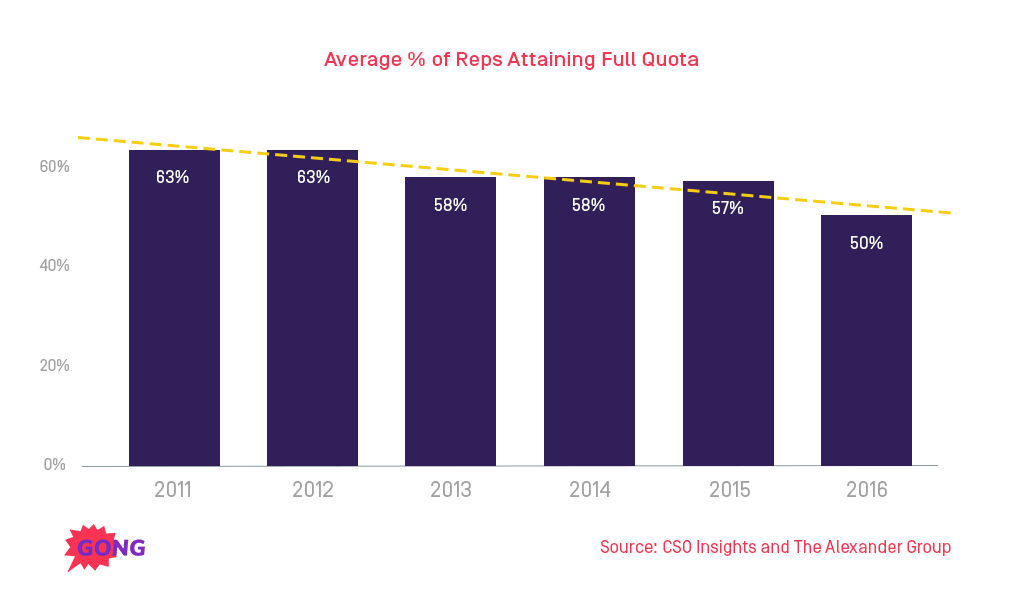
How to win more deals: get better at sales conversations (my experience + data).
Chris Orlob from Gong.io posted an article a few weeks back that literally flipped my stomach upside down. Like, scarier than a horror movie in real life kind of upside down.
If you’re not familiar with what Gong.io does, they use AI to analyze sales conversations and figure out what works and what doesn’t. It’s remarkable work, and I keep tabs on what they’re doing over there because their findings to date have done nothing but support the conclusions I’ve drawn after my 20 years in the sales trenches.
So when their article suggested that salespeople are literally getting worse at sales, I cried a little bit inside. Seriously, see for yourself:

This is a serious problem. And the data suggests that it’s heavily rooted in the failures of salespeople to get sales conversations right.
So that said, I’m must write about this, because I know we can and should be doing this better.
Whatever the reason salespeople are failing to get the conversation right, here are the 4 things that the data and my experience have shown me are the way to foster a winning sales conversation.
Listen first and speak second during sales conversations.
I say this often, but there is a reason we have two ears and one mouth… it’s because listening is the most critical piece of making sure communication happens productively.
Sales conversations are no different.
If I’m being completely honest, I’ve struggled from time to time with listening well over the last 20 years myself. It can be incredibly difficult to shut up and listen when you know in your heart you can truly help the person in front of you! It’s SO easy to get caught up in our own agendas.
But that’s when it’s doubly important to zip our lips and absorb what our prospects are saying. Otherwise, we’ll jeopardize the chance we got to even engage with them in the first place.
For example, I once had a HUGE meeting with all of the key decision makers on a deal when my boss’s boss decided to join us. I had gone through a ton of discovery (read: listening and asking questions for a full year) up front and we were at the place where it was time to ask for a lot of money upfront (think millions).
I briefed him on the details to make sure we brought our A-game, but unfortunately, he took over in the meeting and he turned everyone off (resorted to pushing his agenda, interrupting the client by answering his own questions, and more).
Simply and sadly put, we lost the deal. One year’s worth of work down the drain in a single meeting because of one person’s inability to listen properly. I can’t say I blame the customer either.
Now, I know anyone can cherry pick an example of how a failure to listen has killed a deal. But the data is pretty clear about this – it’s not a one-off occurrence (it’s also not the only time I’ve seen this happen either).
See for yourself what Gong.io found when they analyzed sales calls for talk-to-listen ratios of top performers and everyone else:

Courtesy of Gong.io and Hubspot
Bottom line, if you want to create a winning sales conversation, you should be listening more than you’re speaking.
Let curiosity drive your discovery process.
Listening is a critical element of a winning sales conversation. But it’s driven by the need for something else… understanding.
I would go so far as to say that unless you’re actively seeking to understand, you’re not really listening at all.
After all, how can you really absorb what people are saying if you’re not trying to put together the pieces of what, why, and how they do what they do?
I’ve seen the importance of this myself so many times. But one story in particular really stands out to me.
I was involved in a 20M+ deal that took years to construct with a lot of moving parts, including two COO’s of two mega fortune brands that were merging into 1 company. We were tasked with ensuring a smooth transition for their integration as they unified into a single company.
If we hadn’t kept a close eye on their process at every turn, this would’ve fallen apart in a second. Fortunately, we prioritized staying in tune and we closed a deal worth $26.5M.
Top performing salespeople all have one thing in common… they would rather not guess. They relentlessly seek answers to their questions to put together the pieces of their prospects process and problems before they pitch.
And this is reflected in the way they approach sales conversations, as the data that Gong.io has on this shows:


Note how they ask lots of questions and the conversation becomes a “ping-pong match” as Chris Orlob describes it.
Bottom line, seek to understand and be curious about what the best solution for your clients would be. Those that display a natural curiosity tend to perform consistently better throughout the course of their career than those that don’t.
Which leads me to my next point…
Don’t assume they need you.
I can think of few things more deadly in a sales conversation than to assume that a prospect needs you and your solution.
Sure, your assumption that they do indeed need you may end up being right. But I’m telling you, you’ll blow a lot of deals that could have gone in your favor if you make it a habit to approach all of your prospects like this.
Many of them really can use what you offer but will need you to show them the way!
What we do here at ATP is a great example. We know that truly talented people are rarely unemployed, so to find the best person for an opportunity, we have to understand what’s important to them first before ever talking to them about what we have up our sleeves.
Think about it from your perspective… if Taryn, Debbie, or I approached you right now with a hard pitch on a new role from the perspective that you “absolutely needed this new opportunity”, do you think you’d really be as eager to consider it as if we took time to understand how you would make your decision or what’s important to you?
Likely not. After all, there’s a lot to consider – if you have a family, if you’re used to going into an office but now have to work remote, if you have to be a road warrior, if it fits with your current career goals, and so much more. You’d need some time to warm up to the idea and gather the facts before you’d be open to it.
That’s why my previous point is so important… you have to lead with curiosity and a drive to understand! And that has to be founded on the “clean-slate” assumption that they don’t need you.
How do you find out if they do? Ask a lot of questions. Again, Gong’s research backs this… those that ask more questions to figure out if they really need you (i.e. learn about which business issues they have) win more deals:

When it’s your turn to speak… speak their language, not yours.
I’m hoping that you’re following a theme that is below the surface of all of my points above… sales conversations are not about you and what you want to “tell” them. They’re about supporting your prospect’s needs.
But when it is your turn to speak, you can’t throw this mindset out the window either… you still have to speak using the language that makes the most sense to them and frames your solution around the discover you’ve done.
After all, why take the time to do all of the right legwork up front if you’re just going to ram the same pitch down their throat anyway?
I learned this the hard way when I worked at Yahoo. When I had a meeting with 2 key decision makers who took control of the conversation by asking me a ton of questions upfront, I tried to make up for it by talking in my terms rather than theirs, but it didn’t work. I got too far in the weeds, talked about things they could have cared less about, and took away from their task at hand.
Luckily, they were awesome enough to give me some honest feedback and I was able to get another meeting. After I regrouped and put things on their terms we set up a paid pilot shortly thereafter.
What you need to take away from this: your goal should be an effective pitch that’s shaped by the right discovery legwork up front. Or in other words, the purpose of points 1-3 above are so that you can actually do this point well.
Final thoughts.
I’ll make this quick: the best way to create winning sales conversations is to start each one with the mindset that the prospects need for a solution is more important than your need to make a sale.
I know that’s a really scary thing for a lot of salespeople. But without that mindset, it’s nearly impossible to truly listen, understand, and remove any assumption that they need you. It will also make it nearly impossible to speak on their terms (or ever get to a point with a prospect where you can).
